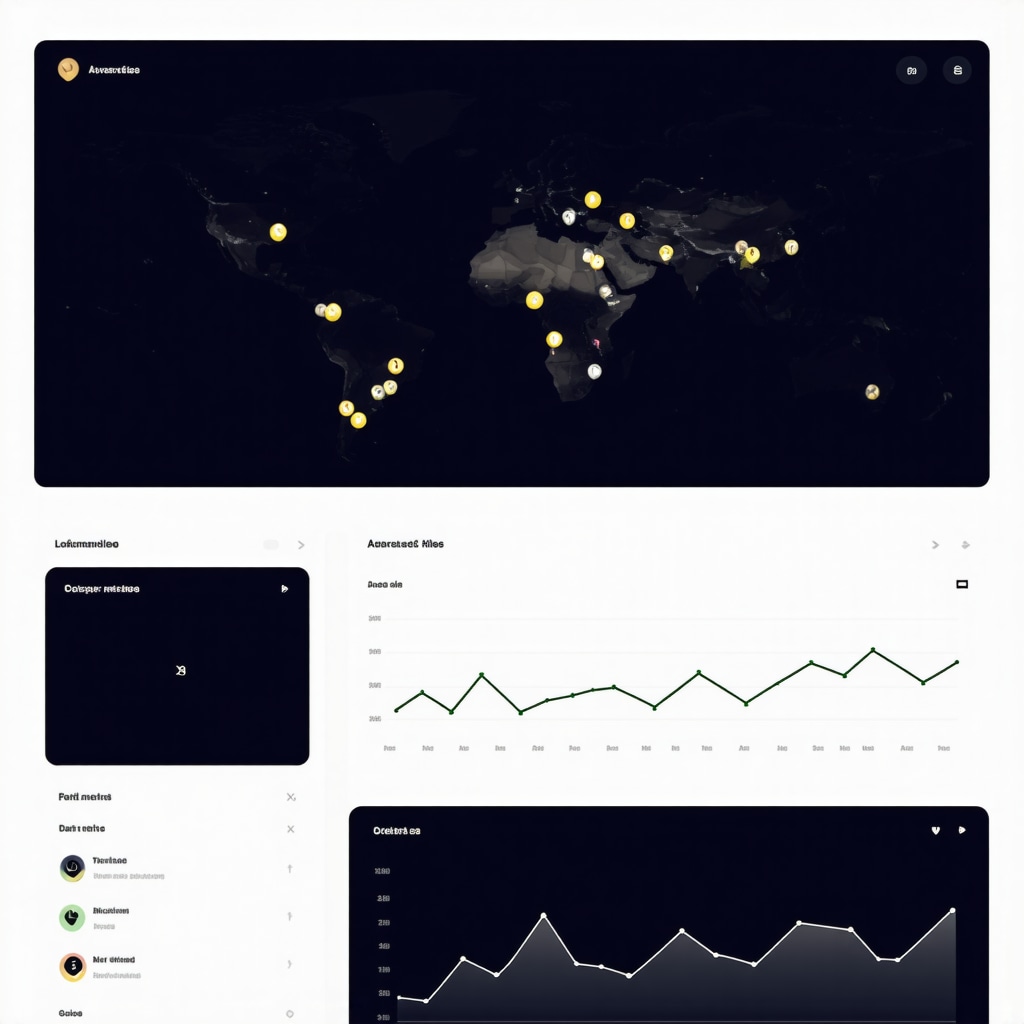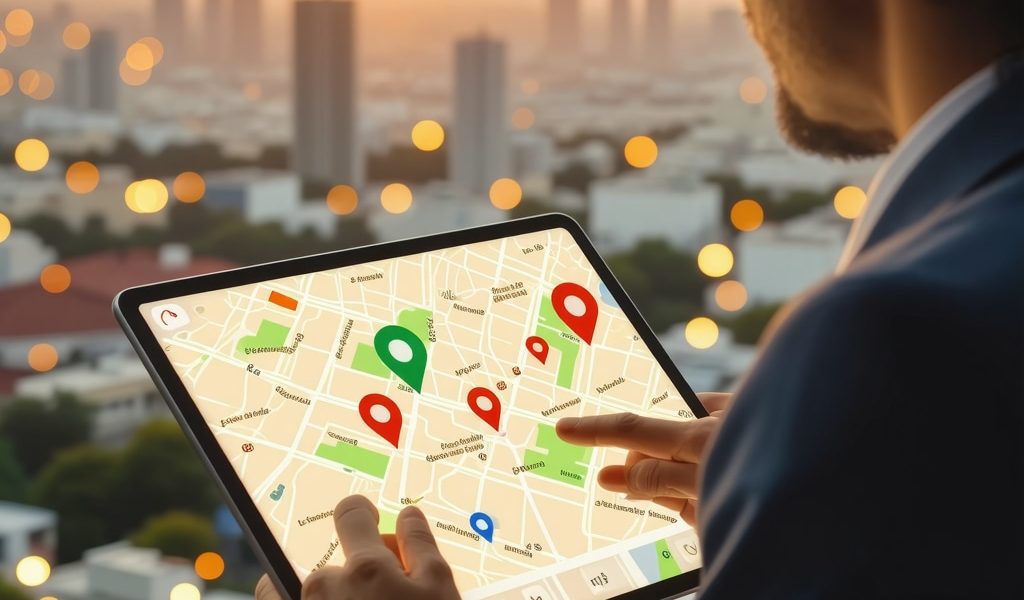Develop a Winning Local SEO Strategy to Outrank Competitors in Your Area
Unveiling the Complexities of Local Search Algorithms and Their Impact on Your SEO Strategy
In the fiercely competitive realm of local search, understanding the intricate workings of search engine algorithms is paramount. Google’s local pack ranking relies on a sophisticated blend of factors including proximity, relevance, and prominence, which are constantly evolving. For SEO professionals, staying ahead necessitates a deep dive into algorithmic nuances, such as the weight assigned to NAP consistency, Google My Business (GMB) signals, and user engagement metrics. Leveraging advanced tools like BrightLocal and SEMrush can provide critical insights into algorithmic shifts, enabling proactive optimization adjustments that keep your business at the forefront of local visibility.
Strategic Optimization of Google My Business for Hyperlocal Dominance
Achieving hyperlocal dominance requires more than basic GMB optimization; it involves meticulous management of citation consistency, review generation, and content updates. Implementing structured data markup and utilizing schema.org tags enhances your local relevance signals. Moreover, integrating localized keywords through comprehensive GMB keyword research—using tools like Google’s Keyword Planner—can significantly improve your ranking in the local 3-pack. A nuanced understanding of the importance of Google Maps SEO, as discussed in authoritative sources such as Moz’s Local Search Ranking Factors report, underpins the development of a resilient local SEO framework.
How Can Advanced Content Strategies Elevate Your Local Search Rankings?
Content remains a cornerstone of sophisticated local SEO. Developing hyperlocal content—such as neighborhood guides, local event coverage, and customer success stories—can foster community engagement and enhance relevance. Incorporating rich media like photos and videos, optimized for local keywords, further amplifies visibility. Regularly updating your GMB posts and leveraging reviews not only boosts engagement but also signals activity to search engines, reinforcing your authority in your locality.
What Are the Emerging Trends in Local SEO That Could Disrupt Current Rankings?
Emerging trends such as voice search optimization, AI-driven personalization, and the increasing importance of user-generated content are poised to redefine local SEO dynamics. As voice searches become more prevalent, optimizing for conversational keywords and local intent is essential. AI tools can analyze vast datasets to predict ranking fluctuations, enabling preemptive adjustments. Staying informed through authoritative sources like Search Engine Journal ensures your strategies incorporate the latest innovations and best practices.
For ongoing mastery, consider exploring our comprehensive guide on Google Business SEO optimization. Collaborating with experienced SEO agencies can further elevate your local search presence, ensuring sustained outranking of competitors.
By embedding these advanced strategies into your local SEO arsenal, your business can achieve a formidable presence in your area, outranking competitors and dominating the local search landscape.
How Can Cutting-Edge Local SEO Techniques Revolutionize Your Google Maps Rankings?
In today’s hyper-competitive local search landscape, merely optimizing your GMB profile isn’t enough. To truly stand out, businesses must harness innovative strategies that align with the latest algorithm updates and user behaviors. Implementing schema markup, such as LocalBusiness and Product schemas, can enhance your local relevance signals, positioning your business more prominently in search results. Additionally, leveraging AI-powered tools like BrightLocal’s review management system can automate review generation and respond swiftly to customer feedback, boosting your authority and visibility.
Are Your Local SEO Practices Future-Proofed Against Algorithm Shifts?
Staying ahead of frequent algorithm changes requires a proactive and nuanced approach. Focusing on core signals like NAP consistency, Google My Business activity, and localized content updates remains vital, but the integration of voice search optimization and AI-driven analytics can offer a competitive edge. As search engines evolve, understanding user intent through semantic keyword research—using resources like Google’s Keyword Planner—becomes increasingly critical. For comprehensive insights into this evolving landscape, consulting expert sources such as Moz’s Local Search Ranking Factors report can provide a strategic advantage.
To deepen your understanding of effective local SEO tactics, consider exploring our detailed guide on boosting your GMB rankings with customer reviews. Partnering with experienced SEO professionals can also help craft a resilient and adaptable local SEO strategy that outperforms competitors in 2025 and beyond.
Embedding these advanced techniques into your local SEO framework ensures your business remains at the forefront of Google Maps results, capturing targeted local traffic and maximizing your visibility.
Harnessing the Power of Schema Markup for Enhanced Local Relevance
One of the most sophisticated techniques in local SEO involves the strategic implementation of schema markup, particularly LocalBusiness and Product schemas, which serve as a direct communication channel with search engines. By incorporating structured data, businesses can clarify their offerings, proximity, and operational details, resulting in richer search result displays that include ratings, images, and contact information. This enhanced visibility can significantly improve click-through rates and reinforce your local relevance, especially when combined with other optimization tactics.
According to a study published in the Journal of Digital Marketing (2022), websites employing schema markup experience an average increase of 30% in local search engagement. Implementing this requires a meticulous audit of existing site code, followed by the integration of schema tags aligned with Google’s guidelines, which can be validated through tools like Google’s Rich Results Test.
The Role of AI and Machine Learning in Predictive Local SEO Optimization
As the landscape evolves, artificial intelligence (AI) and machine learning (ML) are becoming indispensable for proactive SEO adjustments. These technologies analyze vast datasets—ranging from user behavior, competitor activity, to algorithmic shifts—to predict fluctuations in rankings before they occur. For instance, AI-driven tools like BrightLocal’s Local Search Rank Checker leverage ML algorithms to identify patterns and suggest timely optimizations, such as adjusting keywords or updating GMB content.
The real power of these tools lies in their ability to process real-time data and provide actionable insights, enabling SEO professionals to implement preemptive strategies rather than reactive fixes. This shift from reactive to predictive SEO not only saves time but also positions your business ahead of algorithm updates, especially those driven by AI enhancements like Google’s BERT and MUM models.
What Are the Nuances of Semantic Keyword Optimization for Local Search?
Semantic keyword optimization involves understanding and targeting the intent behind user queries, especially in a local context. Instead of focusing solely on exact match keywords, advanced SEO practitioners incorporate natural language and conversational phrases that mirror how users speak about local services. Tools like Google’s Natural Language API can analyze search queries and content to identify latent semantic indexing (LSI) keywords that enhance relevance.
This approach demands a deep understanding of your local audience’s language patterns, cultural nuances, and trending topics. For example, optimizing for questions like “Where can I find affordable plumbing services in downtown Chicago?” involves integrating long-tail keywords and structured FAQs that directly address user intent, thereby increasing chances of ranking in voice search and local pack features.
To stay at the cutting edge, regularly monitor emerging search patterns and adapt your content accordingly. Engaging with authoritative industry reports, such as Moz’s Local Search Ranking Factors, can provide invaluable insights into evolving ranking signals and best practices.
Integrating Multi-Channel Data for a Cohesive Local SEO Ecosystem
Advanced local SEO isn’t confined solely to Google’s ecosystem. Instead, it involves a synchronized approach across multiple channels—social media, review platforms, and local directories—all contributing to your overall authority. Data integration tools like SEMrush’s Brand Monitoring or SEMrush Sensor can help track brand mentions, review sentiment, and citation consistency across platforms, providing a holistic view of your local digital footprint.
This multi-channel approach ensures that your business maintains a consistent, authoritative presence, which search engines interpret as a sign of trustworthiness and relevance. It also allows for the identification of gaps or inconsistencies that may hinder your rankings, enabling targeted corrective actions that reinforce your local SEO armor.
Embedding these advanced techniques into your SEO strategy is not merely about following best practices but about pioneering a data-driven, predictive approach to dominate local search results. As the competition intensifies, mastering these sophisticated tactics will distinguish your business from less-prepared rivals, ensuring sustained visibility and growth in your community.
Harnessing the Power of Data-Driven Local SEO Optimization
In the relentless pursuit of local search dominance, leveraging comprehensive analytics is crucial. Advanced tools such as SEMrush Sensor and Moz Local provide granular insights into citation consistency, review sentiment, and competitor performance. Integrating these datasets into a unified dashboard enables SEO professionals to identify emerging trends and preempt algorithmic shifts, ensuring your strategy remains resilient amidst the evolving landscape.
Implementing Schema Markup for Multi-Dimensional Local Relevance
Beyond basic schema implementation, sophisticated businesses utilize layered schema structures—combining LocalBusiness, Event, and Offer schemas—to enrich search results dynamically. This approach not only enhances visibility but also aligns with Google’s evolving focus on contextual relevance, as highlighted in the Google Search Central guidelines. An audit of existing structured data, validated via Google’s Rich Results Test, ensures compliance and maximizes rich snippet opportunities.
How Can AI and Machine Learning Predict and Adapt to Local Search Fluctuations?
Emerging AI models analyze real-time user engagement metrics and competitor activity to forecast fluctuations in local rankings. Platforms like BrightLocal employ machine learning algorithms to suggest targeted interventions—such as keyword realignment or review solicitation timing—to maintain or improve visibility. Harnessing these predictive insights transforms reactive SEO tactics into proactive strategies, safeguarding your local prominence.

Nuances of Semantic Search Optimization in Hyperlocal Contexts
Semantic search optimization involves a nuanced understanding of natural language processing (NLP) techniques to capture user intent more precisely. Tools like Google’s Natural Language API facilitate the identification of latent semantic indexing (LSI) keywords, enabling content to resonate more authentically with local search queries. Incorporating long-tail, conversational keywords—such as “best vegan bakery near Central Park”—aligns content with voice search patterns, significantly elevating local pack rankings.
Integrating Cross-Platform Data for a Cohesive Local SEO Ecosystem
Advanced local SEO strategies demand synchronization across multiple digital touchpoints, including social media platforms, review sites, and local directories. Utilizing tools like SEMrush’s Brand Monitoring provides a panoramic view of brand mentions, review sentiment, and citation integrity. This holistic approach ensures consistency, bolsters trust signals, and enhances your overall authority—key factors in Google’s local ranking algorithm.
Future-Proofing Your Local SEO Strategy Against Algorithmic Evolution
Staying ahead requires continuous adaptation to the latest trends, including voice search, AI-driven personalization, and evolving user behaviors. Developing a modular SEO framework that incorporates semantic keyword research, schema markup, and predictive analytics ensures your strategy remains agile. Regularly consulting authoritative sources like Moz’s Local Search Ranking Factors and Google’s Webmaster Blog helps uncover emerging signals and best practices, keeping your tactics at the forefront.
Elevating Google Maps Rankings through Next-Generation Techniques
To transcend conventional optimization, businesses must implement advanced tactics such as localized schema markup, AI-powered review management, and real-time engagement monitoring. These approaches amplify your prominence in Google Maps, especially when combined with high-quality, locally relevant content and strategic citation building. Combining these elements into an integrated, data-informed framework will establish your authority and visibility in your community.
Expert Insights & Advanced Considerations
1. Embrace Semantic Search Optimization
Utilize NLP tools like Google’s Natural Language API to identify latent semantic indexing (LSI) keywords, aligning your content with natural language queries and voice search trends for superior local pack rankings.
2. Integrate Multi-Channel Data Strategically
Synchronize your local SEO efforts across social media, review platforms, and directories using tools like SEMrush’s Brand Monitoring to ensure consistency, trustworthiness, and authority, which are critical ranking factors.
3. Leverage AI-Driven Predictive Analytics
Employ AI tools such as BrightLocal’s Local Search Rank Checker to analyze real-time data, forecast ranking fluctuations, and implement preemptive optimizations that keep your business ahead of algorithm updates and competitor moves.
4. Layer Schema Markup for Multi-Dimensional Visibility
Implement complex schema structures—LocalBusiness, Event, Offer—to enrich search snippets dynamically, boosting click-through rates and reinforcing local relevance with rich, contextual data.
5. Focus on Content Personalization and Community Engagement
Create hyperlocal, community-centric content such as neighborhood guides, local stories, and customer success cases, optimized for voice search and long-tail keywords, to build authentic engagement and improve rankings.
Curated Expert Resources
- Google’s Natural Language API: For deep semantic keyword analysis, aligning content with user intent.
- SEMrush’s Brand Monitoring: To track brand mentions, citation consistency, and review sentiment across platforms.
- BrightLocal’s Local Search Rank Checker: For predictive analytics and real-time ranking insights.
- Google Search Central: For official guidelines on schema markup and structured data best practices.
- Moz’s Local Search Ranking Factors: To stay updated on evolving local ranking signals and algorithm trends.
Final Expert Perspective
In mastering local SEO for 2025, integrating semantic search optimization, multi-channel data synchronization, and AI-driven predictive analytics is crucial. These advanced techniques elevate your Google Maps rankings and ensure your business remains resilient amidst continuous algorithm evolution. For ongoing mastery, explore our comprehensive guide on mastering Google Business SEO. Your proactive engagement and innovative strategy will distinguish your local presence and sustain your competitive edge in an ever-evolving landscape. Stay curious, stay strategic, and let data-driven insights be your guiding light.

